PRESERVING A MILITARY LEGACY FOR FUTURE GENERATIONS
The following Reflections represents SGT Raymond L Britt’s legacy of his military service from 1965 to 1971. If you are a Veteran, consider preserving a record of your own military service, including your memories and photographs, on Togetherweserved.com (TWS), the leading archive of living military history. The following Service Reflections is an easy-to-complete self-interview, located on your TWS Military Service Page, which enables you to remember key people and events from your military service and the impact they made on your life. Start recording your own Military Memories HERE.
Please describe who or what influenced your decision to join the Marine Corps.

Sometimes other people believe they know more about another person’s health than a doctor. This is the case in this story and how one’s ignorance forced me to change my life.
After sustaining a severe brain concussion in gym class in October 1964 at Floyd E. Kellam High school and just after school started, my uneducated alcoholic stepfather decided he had seen me in bed long enough, after two months. He did not know or understand what a severe concussion was. He wanted me to either return to school immediately or get a job to subsidize his drinking habits.
Realizing how far behind in school work I already was, I opted for his second choice but not subsidizing his drinking habits. I had severe headaches, constant dizziness, some nausea, and the inability to remember facts of school work. All pointed to my brain had not fully healed.
Therefore, I opted to leave home, join the Marine Corps at 17-years-old, not focusing on what was happening worldwide in a small Asian country called South Vietnam. Unfortunately, the action he wanted cost him more of the money he wanted to get from me. He did not get a dime.
Thanks to my stepfather, on January 5th, 1965, I walked into the Norfolk, Virginia Marine Corps Recruiting Station and yelled to Gunny to show me the bottom line. I never asked for anything special except to get me away from home and the very troublesome alcoholic, uneducated stepfather, whom I came to despise.
The recruiting gunny was so pleased to accommodate a recruit he did not have to fight for and one he did not have to lie to either.
This period of my life was the time for me to cut the thin ties of relationships between my stepfather and me.
The Marine Corps got a new walk-in recruit right off the street that wanted to show my stepfather that I could better myself than his alcoholic station in life despite my serious injuries. So they accepted me into the Corps, and on January 21, 1965, the infamous Parris Island, SC, received me for 13 weeks of Marine training. Company K was the forming company.
They assigned me, the thin, scrawny 135 pounds 5’9 inch 17-year-old, to Platoon 207. That platoon became the Honor Platoon of our 204 through 207 series. We won every ribbon competition but one.
Whether you were in the service for several years or as a career, please describe the direction or path you took. What was your reason for leaving?
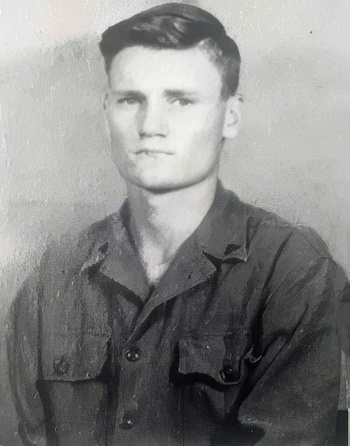
The path I took in service was in personnel administration. I was a natural and learned by OJT, never being sent to an occupational school in the Marine Corps. My typing and administrative abilities eventually landed me processing the many awards the Marines were soon earning in VMO-6, my squadron. It seemed a never-ending battle to stay above the daily influx of new recommended awards earned from Air Medals to Navy Crosses.
This path at my first duty station with VMO-6 would later cause me to be transferred to Headquarters, U. S. Marine Corps at the Navy Annex, Arlington, Virginia. At HQMC, they assigned me to the Decorations and Medals Branch by the Personnel Office, under the CMC Office.
I choose to stay in the Marine Corps for an additional three years after being assigned to HQMC, where I met my wife. I opted to transfer to Independent duty at the 4th Marine Corps District headquarters in Philadelphia, Pennsylvania, for three years. My eventual duty there was for 2 1/2 years, which upset me tremendously, as my wife and I had just lost our first child. I was supposed to have been there for three years.
This is why the Marine Corps lost a 40 year Marine. I only stayed seven. “Your great Chief speaks with forked tongue.” The Marine Corps will do what it wants, when it wants, and how it wants, just like any government agency, despite contracts it may have entered into with any person or agency.
If you participated in any military operations, including combat, humanitarian and peacekeeping operations, please describe those which made a lasting impact on you and, if life-changing, in what way?
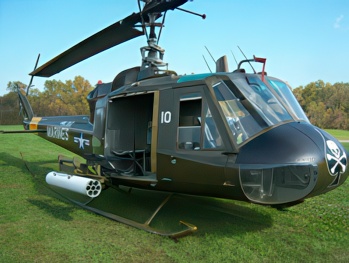
When in a combat zone, you are at risk of taking enemy fire during the day or night. Being shot at changes your life, whether you believe it or not, whether you are on the ground or in the air.
After landing off the USS Princeton by helicopter assault on September 1, 1965 (I took part in that assault that turned out to be a practice drill), I remained on the Ground Defense Force for four months, standing guard duty during the night and working in the company S-1 office during the day. I was also required to go on land combat patrols, walking around outside Ky Ha Marine Air Base to see what we could discover and help local villagers.
In March 1966, I also volunteered to be a UH-1E attack helicopter door gunner. I flew 28 combat missions as a fill-in gunner during the four months of combat flying from March to July 1966. On several missions, I had to use my machine guns to assist the ground pounders being shot at and pinned down in the open fields of fire in South Vietnam.
One day while on a routine aerial patrol, I was the door gunner behind the pilot. I constantly kept my eyes moving to see if any enemy green streaks of fire tracers were coming at our helicopter. The green fire were the tracers, every fifth round with an incendiary coating to show where the bullets were going.
Instead of green tracers, one day, orange tracers were coming at our helicopter. For an instant, it confused me, but the orange tracers kept on coming at our helicopter. Orange tracers were American-made. I returned fire.
Without wasting time, I returned fire and had about a two-minute firefight with the enemy machine gunner, but suddenly he stopped firing at us, and we were still well within the range of the heavy 51-caliber gun.
We had been spitting out over 700 rounds of fire at each other. Then, abruptly, the enemy Orange tracers shooting at our helicopter stopped. Why was American-made ammunition being fired at our chopper? Because the enemy had stolen or captured that ammunition.
Our bird was well within his range, but he quit firing at us. I peppered him with my smaller, faster Gun. He was either dead, dying, or scared the death because there was no way anyone within his circle of fire should have been alive after I had zeroed in on him.
The pilot gave me a thumbs up, indicating his approval of my fast action to protect the four lives aboard the bird as well as the 600,000 dollar bird itself. My commanding officer later put me in for a Navy Accommodation Medal for that and other actions. Flying was so thrilling, as it was dangerously.
Did you encounter any situation during your military service when you believed there was a possibility you might not survive? If so, please describe what happened and what was the outcome.
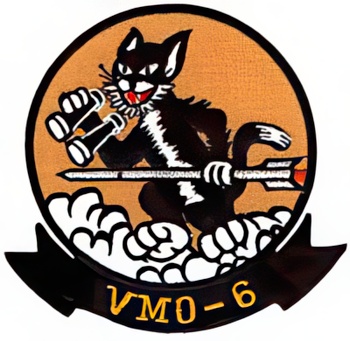
Yes, I had several occasions where I believed I might bite the dust but was not overly concerned too much. I concentrated on my problem at hand and took care of our problem.
The first time was when our Huey came under attack by our American orange ammunition, either stolen or captured 50-caliber machine gun ammunition.
His fire stopped, and I kept on shooting for several seconds until I lost location because I blinked my eyelids. Our bird never received a single hit, not a round of ammunition from the enemy gunner. Since we were well ln range, I surmised I took the gunner out because he stopped firing at us before I stopped firing at him.
We were worth 40,000 dollars to that gunner, and I bet if he were alive, he would not have had allowed us to escape out of his range.
My second experience was when we were up about 8500 feet in an armed Huey traveling around 110 knots. The pilot did not stop the bird for his crew to manually arm the rockets before taking off at the correct ground location.
Therefore, something had to be done. That something would be hazardous for me.
I unbuckled my safety harness, said a quick prayer, stood up, put my hands on the guns, stepped out of the helicopter, and inched my way back to the wires of the electronics to connect the trigger to the rockets and guns.
I inched my way back to the cabin and climbed in. Yes, I looked down as I thought I felt the winds passing me by. The ground seemed to be slowly passing me, but I had to pay extreme attention to my hands and the placement of my feet.
There was nothing extensive for placement of the feet. We did not have parachutes either. Back into the cabin after only a few minutes, I placed my safety harness around my waist. Done all in a day’s work.
Of all your duty stations or assignments, which one do you have fondest memories of and why? Which was your least favorite?
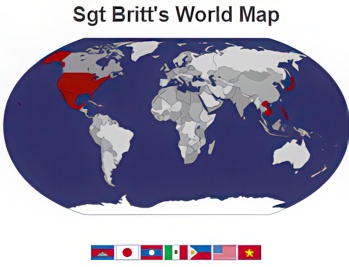
I loved being stationed at HQs Marine Corps, Arlington, Virginia, mostly because of the history of the area and a choice assignment.
I hated being at the Supply Center, Albany, Georgia. The Supply Depot was my duty station after my return to CONUS from the Vietnam War.
From your entire military service, describe any memories you still reflect back on to this day.
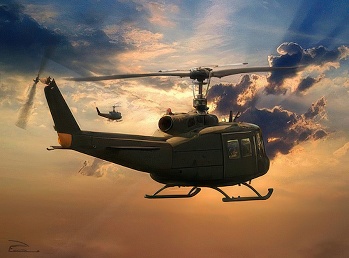
In war, you make so many memories, but some never seem to fade away. I have several stuck deep into my soul, which still brings tears and remorse to my being, unconsciousness, and now tender heart.
At the now age of 74, and then at 18 years old, I found myself involved directly in the Vietnam War.
On September 1, 1965, we landed ay Ky Ha, South Vietnam, off the USS Princeton at a peninsula. We began our aerial assault just after sunup. I was on the 2d wave of transport helicopters, so I really didn’t know what to expect. Thank goodness we took no gunfire. The force took action for security as the others did what they do to build a base.
The Marine Group quickly began base and combat operations despite the monsoon rains and storms lasting for weeks and months. By November, our Group and the squadron were in full combat mode, and by Thanksgiving Day, we had lost our first casualties of war, just only being in war for only two months.
The first was Lance Corporal Benny Hack and Captain Glenn Dill Mann, within days of each other and close to Thanksgiving Day. Gloom set into the squadron. It was quickly established in the squadron. We were not in a game here, but the seriousness of war, with life and death situations.
We trained for many months and years to be killers in war and be killed by our enemies. War had started for our squadron! The payback to the enemy would be costly for the Viet Cong and the North Vietnamese over the course of years. Our squadron and Group would see to that.
Another death that set our squadron back was that of Major William Joseph Goodsell. He died after being wounded above hill 488, the site of The Medal of Honor in South Vietnam, on June 16th, 1966, to then Staff Sergeant Jimmie Howard.
The Major was our commanding officer and earned the Navy Cross posthumously.
The deaths of Major Goodsell and Captain Mann impacted me most because I saw them as father and grandfather figures.
Growing up, I had no positive male role models in my life, so I choose two magnificent male officers and positive models to become mentors to me. Major Goodsell and Captain Mann were my bosses. I still mourn both their losses today.
What professional achievements are you most proud of from your military career?

Foremost, I am proud to have earned the title of Marine, earning the title of Patriot, too, to serve in a War we involved this country in and choose not to allow us, the Patriots, to win.
As an administrative Marine, I am also proud to have earned these Medals, too: the Combat Air Crew Wings; the Air Medal; two Navy Achievement Medals with one, with Combat “V”; my Vietnamese Gallantry Cross with Palm and frame; and my Expert pistol badge. And here I was, an administrative man.
Patriots generally pay a high price for what they do to earn their title of Patriot. I am no exception. My price came with the death of five unborn children, three sickly children, two broken marriages, and several destroyed lives. Most of the spontaneous abortions came about from my direct contact with Agent Orange in Vietnam.
If 90% of people living in America believe war is a piece of cake, look at the homeless heroes and the multitudes of veterans who have committed suicide and those who have failed but tried, including me.
Of all the medals, awards, formal presentations and qualification badges you received, or other memorabilia, which one is the most meaningful to you and why?
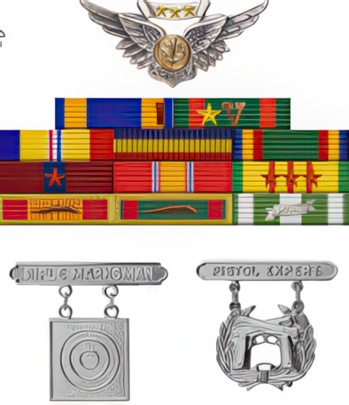
I cherish the following medals: the Marine Combat Aircrew Wings, the Air Medal, the Navy Achievement Medal with combat V and a gold star for the second Navy Achievement; I also cherish the Unit Vietnamese Gallantry Cross with Palm and Frame along with the Pistol Expert Badge.
Why are my medals meaningful to me? Because now, as I look at my life, I can fully see how heroic I was at the age of 17 and 18 years old. It was all in a day’s work.
Which individual(s) from your time in the military stand out as having the most positive impact on you and why?
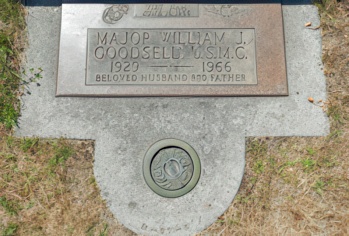
Major William Joseph Goodsell and Captain Glenn Dill Mann, both officers of VMO-6, were killed in action. Before their deaths, both were instrumental to me secretly serving as a grandfather and father figure, respectively. I did not have a positive male role model in my youth years, so after joining the Marines, I took the best choices of officers and imagined they were my father and grandfather. I wanted to learn their best qualities and emulate those qualities within me.
These two Marines, gentlemen, were helping me more than they ever knew. Of course, they were never aware of what I WANTED FROM THEM. I wanted their undivided attention and favor as they mentored me to become a man in this crooked and sinful world.
Can you recount a particular incident from your service which may or may not have been funny at the time but still makes you laugh?
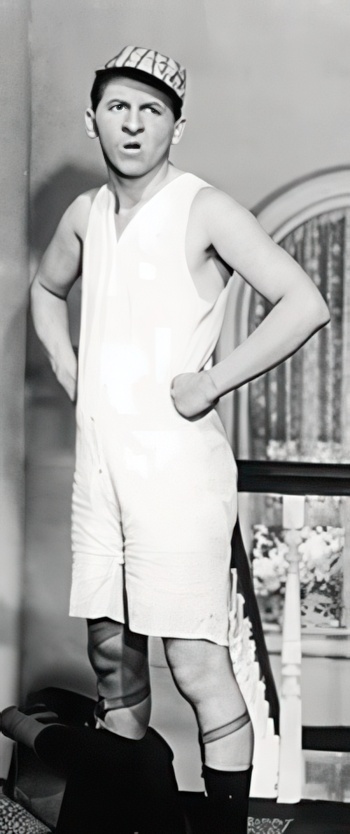
In combat, one should not be wearing white at night. You do not want to be a visible target for the enemy.
One evening I took a much-needed shower. All I had for clean underwear was a set of white Tee shirts and boxer shorts. Thinking nothing about it, white went on. Bad, bad mistake. I had not slept out of or away from the ground for weeks. I opted to sleep in a tent alone. I bedded down early that evening off the ground.
Several hours later, someone came into my tent yelling; we are under attack. Jumping up, I didn’t try to put any clothes on but gathered up my clean clothes, all my gear, included rifle, ammunition belts, canteens with water. And under a bright clear moon that evening, I was seen heading in a white streak for my foxhole, loaded down just as fast as I could without playing around.
At that time, I did not see anything funny about my being in white when we came under a ground attack by the enemy and being seen in white at night.
As the years fly by now, I can only imagine if I were to see the same thing, I would probably laugh my ass off seeing this half-naked man dressed only in the white, at night, loaded to the gills in material, running like hell not to get killed. How I managed not to drop anything was a blessing to me.
What profession did you follow after your military service, and what are you doing now? If you are currently serving, what is your present occupational specialty?
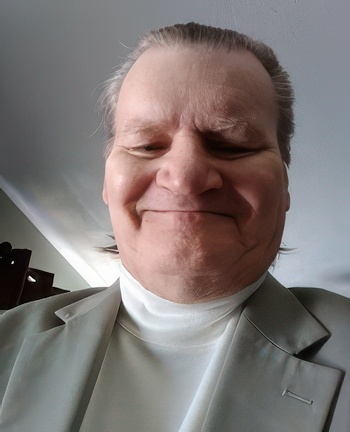
When I got out of service to my country, we did not have everything there is today to assist our veterans in finding themselves. Having serious PTSD, it took years to find me a suitable job. But then, after only a short time, I would want to move back and forth from the south to the north back to the south.
It took considerable money, time, and effort to have moved so many times at great distances. I was running from life and did not know why. Eventually, I was hired by the Virginia Beach, Virginia police department as a police clerk, responsible for the precinct administrative matters. After a serious illness to my newborn, I moved to Michigan again. Later, after having moved to Wisconsin, I found a job as a Deputy Sheriff.
I was a full deputy, with full arrest power, but was assigned to the jail. When needed, I would ride with other deputies. While a deputy, I applied as a Wisconsin State Policeman and was invited to training but declined because of serious PTSD symptoms.
I then learned what I had and what caused me to become the way I did. A state police job was what I wanted in life, but with PTSD, that job was out of the question, and any other law enforcement and corrections job. My life crumbled and fell apart.
Now I am disabled and retired.
In what ways has serving in the military influenced the way you have approached your life and your career? What do you miss most about your time in the service?
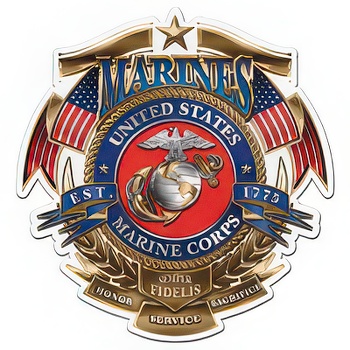
Having been out of the military for so long, over 50 years, I can say it influenced my life considerably. There is not a day that I do not think something about the military, calling cadence, looking up something on google about the military, statistics, etc. I miss the strict discipline, the marching of 70 men as one, hearing the steps as one crisp noise. And the crisp uniform of a Marine first thing in the morning. I miss the Green Machine because I am still a Marine, and I belong to the Marine Brotherhood. Semper Fi!
Based on your own experiences, what advice would you give to those who have recently joined the Marine Corps?
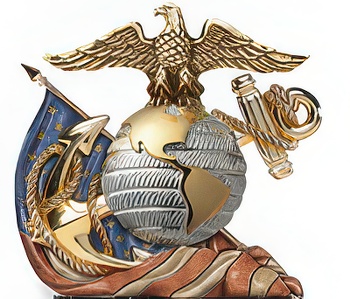
What advice would I give based on my experience?
I would say if you are not the outdoors type of guy, one that doesn’t love risk, danger, and the one that likes to be alone, do not enter the Marine Corps because the Marine Corps is not your type of occupation.
If you do not like to fight or an emotional type of person, you probably should think about another line of work too.
But, even if you are some or maybe all of the above, you can still survive the Marine Corps.
Here is how. Through your attitude, fortitude, desire, willingness to survive and be the best you can be. Do not ever give up, stop, or walk away.
Make those mountains of challenges like molehills by analyzing and cutting slices away from the mountain to manage the problem. And never give up.
In what ways has togetherweserved.com helped you remember your military service and the friends you served with.
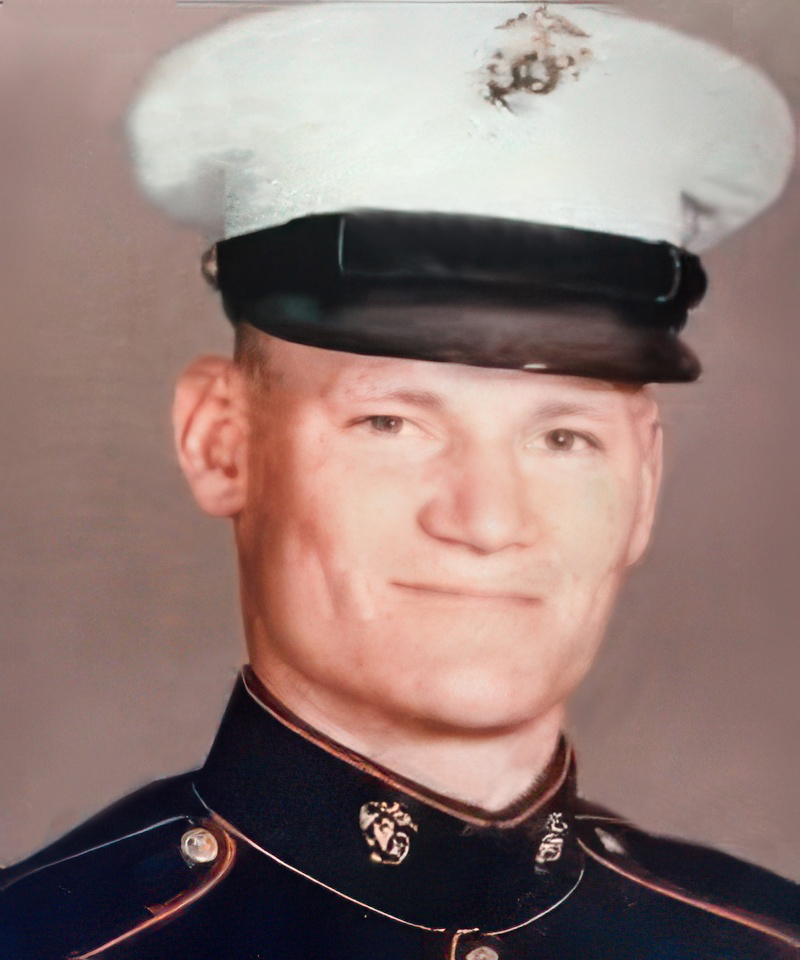
Foremost, I never had friends for seven years. I had brothers but not friends, and I would keep their backs safe, but not a friendly one. It is doubtful that not a single one of those 60 others that served with VMO-6 on this site could hardly tell you one thing about me they learned at Camp Pendleton or in Vietnam.
PRESERVE YOUR OWN SERVICE MEMORIES!
Boot Camp, Units, Combat Operations
Join Togetherweserved.com to Create a Legacy of Your Service
U.S. Marine Corps, U.S. Navy, U.S. Air Force, U.S. Army, U.S. Coast Guard

Heartfelt reflection. Semper Fi many of us do understand.